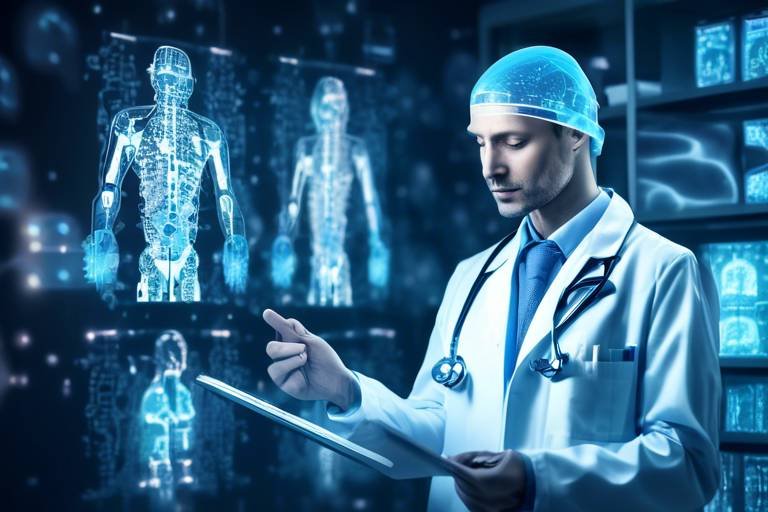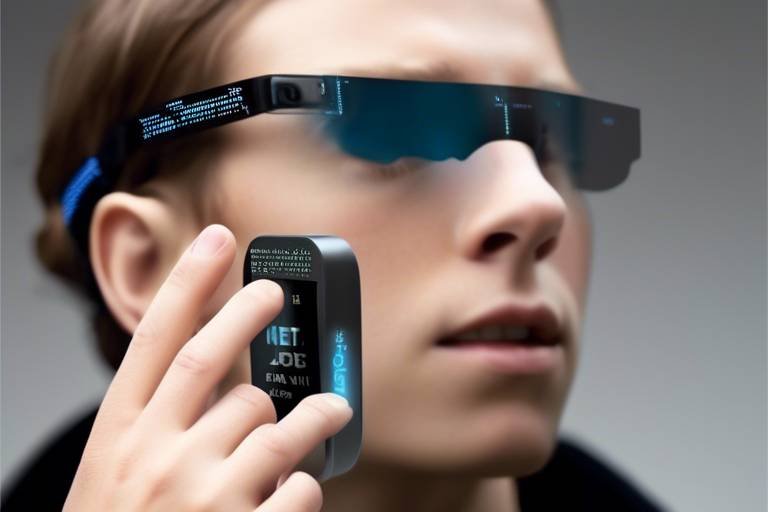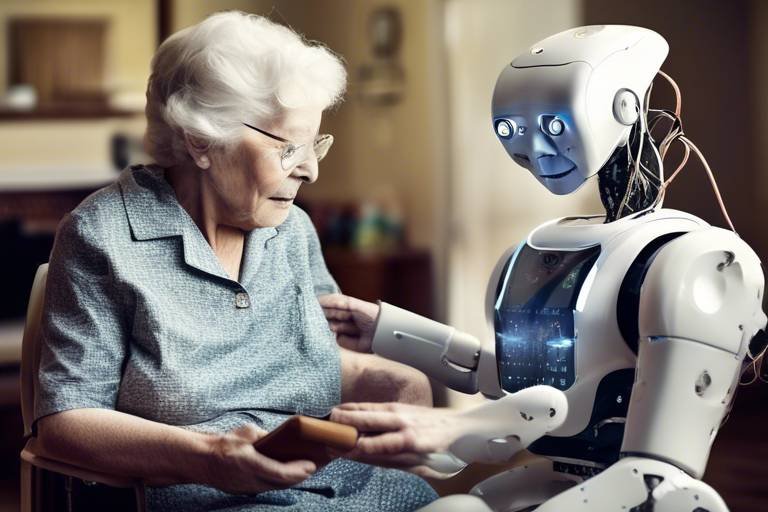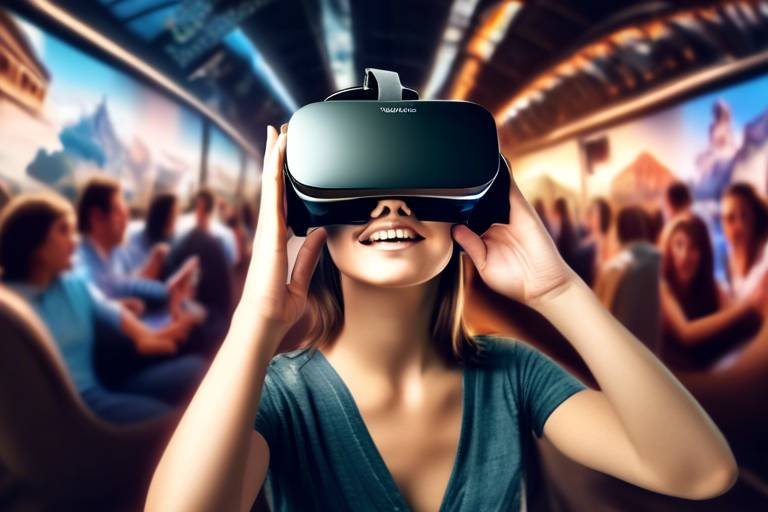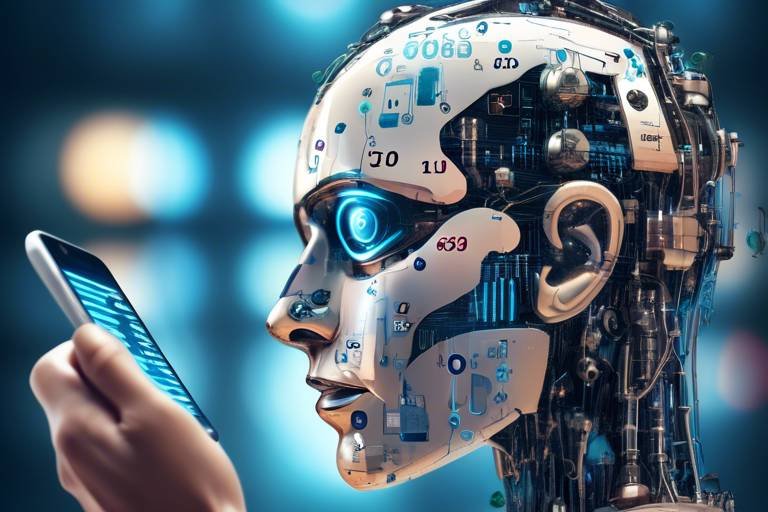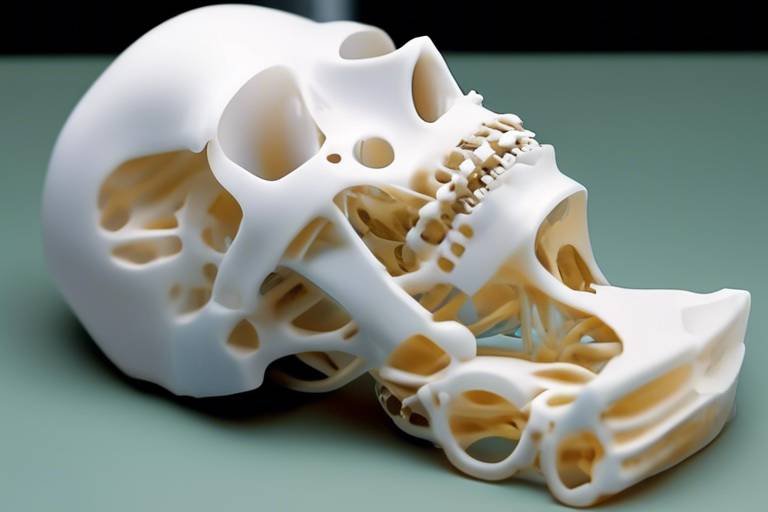How Artificial Intelligence Will Change Healthcare Diagnostics
In today's fast-paced world, the intersection of artificial intelligence (AI) and healthcare diagnostics is nothing short of revolutionary. Imagine a future where healthcare professionals are equipped with cutting-edge tools that not only enhance their ability to diagnose but also improve patient outcomes. This article explores the transformative impact of AI on healthcare diagnostics, highlighting advancements, benefits, challenges, and future possibilities in the field. As we delve into this topic, you'll discover how AI is reshaping the landscape of medical diagnostics and paving the way for a healthier tomorrow.
Artificial intelligence is revolutionizing diagnostics by enhancing accuracy and efficiency. AI algorithms analyze vast amounts of medical data, including imaging, lab results, and patient histories, assisting healthcare professionals in making informed decisions. These algorithms can sift through complex datasets much faster than any human could, identifying patterns and anomalies that might go unnoticed. The result? A more precise diagnostic process that not only saves time but also significantly improves patient care.
AI offers a plethora of benefits in healthcare diagnostics, including improved speed, reduced costs, and increased accessibility. With AI, healthcare providers can deliver diagnoses more rapidly, enabling timely treatment interventions. This is particularly crucial in emergency situations where every second counts. Moreover, AI can help lower healthcare costs by streamlining processes and reducing the need for unnecessary tests.
One of the most compelling advantages of AI in diagnostics is its ability to enhance accuracy. AI systems can analyze vast datasets to identify patterns that human practitioners might miss, significantly improving diagnostic precision. For instance, AI algorithms have shown remarkable success in detecting conditions such as cancers, diabetes, and even rare diseases that often elude traditional diagnostic methods. By leveraging machine learning, these systems continuously learn from new data, refining their accuracy over time.
At the forefront of AI in diagnostics are machine learning algorithms. These algorithms learn from historical data and improve their predictive capabilities, making them invaluable in clinical settings. For example, a machine learning model trained on thousands of radiology images can outperform human radiologists in identifying tumors. This not only boosts diagnostic confidence but also allows healthcare professionals to focus on patient care rather than getting bogged down by data analysis.
AI also facilitates the integration of diverse data sources, including imaging, lab results, and patient history. This holistic approach leads to better diagnostic outcomes by providing a comprehensive view of a patient’s health. Imagine a system where all relevant patient information is seamlessly connected, allowing healthcare providers to make well-informed decisions quickly. This integration is crucial for developing personalized treatment plans that cater to individual patient needs.
Despite its potential, AI in diagnostics faces challenges such as data privacy concerns and the need for robust validation. As healthcare data becomes increasingly digitized, ensuring the security and privacy of sensitive patient information is paramount. Additionally, AI systems require extensive validation to ensure their reliability and effectiveness in real-world scenarios. Addressing these limitations is crucial for the successful implementation of AI technologies in healthcare diagnostics.
The future of AI in healthcare diagnostics looks promising, with ongoing research and development paving the way for innovative solutions. Emerging trends such as predictive analytics and natural language processing are set to further enhance diagnostic capabilities. As these technologies evolve, we can expect even more sophisticated tools that empower healthcare professionals to provide optimal patient care.
AI is paving the way for personalized medicine by analyzing individual patient data to tailor diagnoses and treatments. This approach considers factors such as genetics, lifestyle, and environmental influences, leading to more effective and targeted therapies. Imagine a world where your treatment plan is uniquely designed based on your specific health profile—this is not just a dream; it’s becoming a reality thanks to AI.
Effective integration of AI in diagnostics requires collaboration between technology and healthcare professionals. The importance of interdisciplinary teamwork cannot be overstated. By working together, technologists and healthcare providers can ensure that AI tools are user-friendly, clinically relevant, and truly beneficial to patient care. This collaborative spirit is essential for maximizing the benefits of AI and ensuring that it complements rather than replaces the human touch in healthcare.
- What is AI in healthcare diagnostics? AI in healthcare diagnostics refers to the use of artificial intelligence technologies to analyze medical data and assist healthcare professionals in diagnosing diseases more accurately and efficiently.
- How does AI improve diagnostic accuracy? AI systems can analyze vast datasets to identify patterns and anomalies that human practitioners might overlook, leading to more precise diagnoses.
- What are the challenges of using AI in diagnostics? Challenges include data privacy concerns, the need for robust validation, and ensuring that AI systems are integrated effectively with existing healthcare practices.
- What is personalized medicine? Personalized medicine involves tailoring medical treatment to the individual characteristics of each patient, often facilitated by AI analysis of personal health data.

The Role of AI in Diagnostics
Artificial intelligence is not just a buzzword; it's a game changer in the world of healthcare diagnostics. Imagine a world where doctors have access to tools that can sift through mountains of medical data in a fraction of the time it would take a human. That's precisely what AI brings to the table. By utilizing advanced algorithms, AI can analyze complex medical data, from imaging scans to genetic information, and present actionable insights that help healthcare professionals make informed decisions. This not only enhances the speed at which diagnoses are made but also improves their accuracy, leading to better patient outcomes.
One of the most exciting aspects of AI in diagnostics is its ability to learn and improve over time. Through machine learning, these systems can adapt to new data, refining their algorithms and becoming more proficient at identifying patterns that might elude even the most experienced practitioners. For example, AI can analyze thousands of X-ray images, learning from each case to differentiate between normal and abnormal findings with remarkable precision. This capability is akin to having a seasoned expert by your side, continuously learning from every single case.
Moreover, AI's role extends beyond just interpreting images or lab results. It can integrate diverse data sources, creating a comprehensive view of a patient's health. This holistic approach means that AI can consider everything from a patient's medical history to their lifestyle choices, providing a more rounded perspective that aids in diagnosis. For instance, when diagnosing conditions like diabetes, AI can evaluate blood sugar levels, dietary habits, and even genetic predispositions to offer a tailored diagnosis and treatment plan.
However, the implementation of AI in diagnostics isn't without its challenges. Issues such as data privacy and the need for rigorous validation of AI models are critical considerations. As we integrate these technologies into healthcare, it's essential to ensure that patient data remains secure and that AI tools are thoroughly tested to confirm their reliability. The balance between innovation and ethical responsibility is crucial in this rapidly evolving field.
In summary, the role of AI in diagnostics is transformative, offering unprecedented accuracy and efficiency. By leveraging machine learning and data integration, AI stands to revolutionize how healthcare professionals diagnose and treat patients. As we continue to explore the potential of AI, it’s clear that its impact will be felt for generations to come.

Benefits of AI in Healthcare
Artificial Intelligence (AI) is not just a buzzword; it's a game changer in the realm of healthcare diagnostics. Imagine walking into a clinic and knowing that the diagnostic process will be faster, more accurate, and tailored just for you. Sounds like science fiction, right? Well, it's becoming a reality, and the benefits of AI in healthcare are truly remarkable. From improving speed and reducing costs to increasing accessibility, AI is reshaping how we think about medical diagnostics.
One of the most significant advantages of AI is its ability to process vast amounts of data in a fraction of the time it would take a human. This capability means that healthcare professionals can receive insights and recommendations almost instantaneously. For instance, AI algorithms can analyze medical images, such as X-rays or MRIs, and highlight potential issues that a radiologist might overlook. This enhanced accuracy is crucial in diagnosing conditions like tumors or fractures, where every second counts.
Moreover, AI systems can learn and adapt over time. With the use of machine learning algorithms, these systems continuously improve their predictive capabilities. They analyze historical data, recognize patterns, and refine their models, which leads to better diagnostic outcomes. For example, an AI tool trained on thousands of dermatology images can help dermatologists identify skin cancer with astounding precision, often outperforming human experts.
Another aspect worth mentioning is the integration of diverse data sources. AI doesn't just operate in a vacuum; it can pull information from various platforms, including electronic health records, lab results, and imaging studies. This holistic approach allows for a more comprehensive view of a patient's health, enabling healthcare providers to make informed decisions. Imagine a doctor having all the relevant data at their fingertips, leading to a more accurate diagnosis and personalized treatment plan.
Accessibility is another critical benefit of AI in healthcare. By automating routine tasks and streamlining processes, AI can help reduce the burden on healthcare systems, making it easier for patients to access the care they need. This is especially important in underserved areas where medical professionals are scarce. AI-driven telemedicine platforms can provide consultations and diagnostic support remotely, bridging the gap between patients and healthcare providers.
To summarize, the benefits of AI in healthcare diagnostics are profound:
- Improved Speed: Faster processing of medical data leads to quicker diagnoses.
- Reduced Costs: Automation can lower operational costs, making healthcare more affordable.
- Increased Accessibility: AI can extend healthcare services to remote and underserved populations.
- Enhanced Accuracy: AI tools can identify patterns and anomalies that human eyes might miss.
As we continue to explore the integration of AI in healthcare, it's clear that its benefits are not just theoretical; they are practical, tangible, and transformative. The future of healthcare diagnostics is bright, and AI is leading the way toward a more efficient and effective system.
Q: How does AI improve diagnostic accuracy?
A: AI improves diagnostic accuracy by analyzing large datasets to identify patterns that human practitioners may overlook. This capability allows for earlier and more precise diagnoses.
Q: Are there any risks associated with AI in healthcare?
A: Yes, there are challenges such as data privacy concerns and the need for robust validation of AI systems. Ensuring these systems are secure and reliable is crucial for their successful implementation.
Q: Can AI completely replace healthcare professionals?
A: No, AI is designed to assist healthcare professionals, not replace them. The best outcomes occur when AI and human expertise work together in harmony.

Enhanced Accuracy
When it comes to healthcare diagnostics, accuracy is not just a goal—it's a necessity. Imagine walking into a doctor's office, feeling anxious about your health, and relying on a diagnostic tool that can pinpoint your issue with remarkable precision. This is where artificial intelligence (AI) steps in as a game-changer. By leveraging advanced algorithms and machine learning techniques, AI systems can analyze vast datasets far beyond the capacity of human practitioners. This capability allows them to identify patterns and correlations that might go unnoticed by the human eye, leading to significantly enhanced diagnostic accuracy.
For instance, studies have shown that AI can outperform radiologists in detecting certain types of cancers in medical imaging. In a recent study, a deep learning algorithm demonstrated an accuracy rate of over 94% in identifying breast cancer from mammograms, compared to a 88% accuracy rate from human radiologists. This disparity highlights the potential of AI to not only match but exceed human capabilities in specific diagnostic tasks.
Moreover, AI's ability to continuously learn from new data means that its performance improves over time. This is particularly important in the field of healthcare, where new research and clinical findings are constantly emerging. By incorporating the latest information, AI systems can adapt and refine their diagnostic criteria, ensuring that healthcare professionals have access to the most accurate and up-to-date assessments. This adaptability is akin to having a personal coach who learns from each training session to help you achieve your best performance.
Additionally, the integration of AI into diagnostics can lead to a more holistic understanding of a patient's health. By analyzing diverse data sources—including imaging, lab results, and patient history—AI can provide a comprehensive picture that helps clinicians make informed decisions. For example, when diagnosing a complex condition like diabetes, AI can evaluate not only blood sugar levels but also lifestyle factors, genetic predispositions, and even social determinants of health. This multifaceted approach ensures that no stone is left unturned in the quest for accurate diagnoses.
| Diagnostic Method | AI Accuracy (%) | Human Accuracy (%) |
|---|---|---|
| Breast Cancer Detection | 94 | 88 |
| Skin Lesion Classification | 95 | 86 |
| Lung Cancer Detection | 92 | 89 |
In conclusion, the enhanced accuracy brought about by AI in diagnostics is nothing short of revolutionary. By harnessing the power of machine learning and data integration, healthcare providers can offer diagnoses that are not only faster but also more reliable. As we look to the future, the collaboration between AI systems and healthcare professionals will undoubtedly lead to improved patient outcomes and a new era of precision medicine.
- How does AI improve diagnostic accuracy? AI improves diagnostic accuracy by analyzing large datasets to identify patterns and correlations that may be missed by human practitioners.
- Can AI replace human doctors in diagnostics? While AI can enhance diagnostic accuracy, it is intended to assist healthcare professionals, not replace them. Collaboration is key.
- What types of diseases can AI help diagnose? AI has shown promise in diagnosing various diseases, including cancers, cardiovascular conditions, and neurological disorders.

Machine Learning Algorithms
Machine learning algorithms are the backbone of artificial intelligence in healthcare diagnostics, acting like the brain that processes vast amounts of medical data to derive meaningful insights. Imagine having a super-smart assistant who can sift through mountains of information in seconds—this is precisely what machine learning does. These algorithms are designed to learn from data, continuously improving their performance over time without human intervention. They can identify complex patterns in data that would be nearly impossible for a human to detect, making them invaluable in the diagnostic process.
There are several types of machine learning algorithms, each with its own strengths and applications in healthcare diagnostics. For instance:
- Supervised Learning: This type involves training the algorithm on a labeled dataset, where the outcomes are known. It’s like teaching a child by showing them examples. In diagnostics, this could mean training an algorithm to recognize cancerous cells by providing it with images of both healthy and unhealthy tissues.
- Unsupervised Learning: In contrast, this method works with unlabeled data, allowing the algorithm to find patterns on its own. This is akin to exploring a new city without a map and discovering hidden gems. In healthcare, this can help in identifying new disease subtypes or patient clusters.
- Reinforcement Learning: This type mimics the way humans learn from their environment by receiving feedback. It’s like training a dog; the algorithm learns what actions yield positive outcomes and adjusts its strategies accordingly. In diagnostics, it can optimize treatment plans based on patient responses.
One of the most exciting aspects of machine learning algorithms in diagnostics is their ability to improve with exposure to more data. As these algorithms encounter new cases, they refine their predictive capabilities, becoming more accurate over time. This adaptability is crucial in a field like healthcare, where new diseases and variations are constantly emerging. For example, an algorithm initially trained on a specific type of cancer may evolve to recognize different subtypes or even entirely new conditions as it processes more patient data.
Moreover, machine learning algorithms can integrate various data types—from imaging results to genetic information—creating a comprehensive view of a patient's health. This holistic approach enhances diagnostic accuracy and supports more personalized treatment plans. By analyzing diverse datasets, these algorithms can uncover connections that human practitioners might overlook, leading to earlier and more accurate diagnoses.
However, the implementation of machine learning in diagnostics is not without its challenges. Data quality is paramount; if the input data is flawed or biased, the algorithm's output will reflect those issues. Therefore, continuous validation and monitoring of these algorithms are essential to ensure they remain effective and reliable. As we look to the future, the evolution of machine learning algorithms promises to transform healthcare diagnostics, making them faster, more accurate, and ultimately, more beneficial for patients.
Q1: How do machine learning algorithms improve diagnostic accuracy?
A1: Machine learning algorithms analyze vast datasets to identify patterns and correlations that may not be immediately apparent to human practitioners, thereby enhancing diagnostic accuracy.
Q2: Can machine learning algorithms work with different types of medical data?
A2: Yes, these algorithms can integrate various types of data, such as imaging, lab results, and patient history, to provide a comprehensive diagnostic overview.
Q3: What are the challenges associated with using machine learning in diagnostics?
A3: Challenges include data privacy concerns, the need for high-quality data, and the necessity for continuous validation to ensure the algorithms remain accurate and reliable.
Q4: How do machine learning algorithms learn over time?
A4: These algorithms improve their performance by processing new data and adjusting their models based on the outcomes, similar to how humans learn from experience.

Data Integration
In the age of digital healthcare, stands as a cornerstone for enhancing diagnostic accuracy and patient outcomes. Imagine a world where a doctor can access a patient's entire medical history, lab results, imaging studies, and even genetic information at their fingertips. This is not just a dream; it is becoming a reality thanks to artificial intelligence. AI facilitates the seamless merging of diverse data sources, allowing healthcare professionals to make more informed decisions. By analyzing a comprehensive dataset, AI algorithms can uncover hidden patterns and correlations that may not be evident when looking at isolated pieces of information.
The integration of data sources can be broken down into several key components:
- Imaging Data: AI can analyze X-rays, MRIs, and CT scans, providing insights that assist radiologists in identifying anomalies.
- Laboratory Results: By aggregating lab results, AI can recognize trends in biomarkers, helping to detect diseases at earlier stages.
- Patient History: A patient's medical history, including past diagnoses and treatments, is crucial for accurate diagnosis. AI systems can analyze this data to provide context for current symptoms.
- Genomic Data: With the rise of personalized medicine, integrating genomic data allows for tailored treatment plans based on an individual's genetic makeup.
To illustrate the impact of data integration on diagnostics, consider a scenario where a patient presents with vague symptoms. A traditional approach might involve a series of tests based on the physician's intuition. However, with AI-driven data integration, the system can analyze the patient's previous medical records and correlate them with similar cases from a vast database. This comprehensive analysis can lead to a more accurate diagnosis and faster treatment plan, ultimately saving precious time and resources.
Furthermore, the integration of data is not limited to just one healthcare facility. AI can connect multiple healthcare providers, creating a more holistic view of a patient's health across different settings. This interconnectedness is especially beneficial for chronic disease management, where continuous monitoring and timely interventions can significantly improve patient outcomes. As we move forward, the challenge will be to ensure that this integration is done securely and ethically, maintaining patient privacy while maximizing the benefits of AI in diagnostics.
In conclusion, data integration powered by artificial intelligence is revolutionizing healthcare diagnostics. It not only enhances the accuracy of diagnoses but also streamlines the healthcare process, making it more efficient and patient-centered. As we embrace these advancements, the potential for improved health outcomes grows exponentially, paving the way for a future where healthcare is not just reactive but proactively tailored to individual needs.

Challenges and Limitations
While the potential of artificial intelligence (AI) in healthcare diagnostics is undeniably exciting, it is crucial to acknowledge the that accompany this technological revolution. Firstly, one of the most pressing concerns is data privacy. With AI systems relying heavily on vast amounts of patient data, the risk of sensitive information being compromised is a significant issue. Healthcare providers must navigate complex regulations, like HIPAA in the United States, to ensure that patient data is handled with the utmost care and confidentiality.
Another challenge lies in the need for robust validation of AI algorithms. Just because an AI system shows promise in a controlled environment doesn’t mean it will perform equally well in real-world clinical settings. Implementing AI technologies requires extensive testing and validation to ensure that these systems can deliver accurate and reliable results across diverse populations and conditions. The consequences of inaccurate diagnostics can be dire, potentially leading to misdiagnoses and inappropriate treatments.
Moreover, there’s the issue of interoperability. Many healthcare systems use different technologies and data formats, making it difficult for AI solutions to integrate seamlessly. This lack of standardization can hinder the effectiveness of AI in diagnostics, as it may not be able to access or analyze all relevant data. For instance, if an AI system can’t pull data from a patient’s electronic health record, it may miss critical information that could influence a diagnosis.
Additionally, there’s a skills gap in the healthcare workforce. Many healthcare professionals may not be adequately trained to work alongside AI technologies. This gap can lead to resistance in adopting AI tools, as practitioners may feel overwhelmed or unsure about how to interpret AI-generated insights. Bridging this gap through targeted education and training programs is essential for the successful integration of AI in diagnostics.
Finally, the ethical implications of AI in healthcare diagnostics cannot be ignored. Questions surrounding accountability arise when AI systems make decisions. Who is responsible if an AI system makes a mistake? Is it the healthcare provider, the technology developer, or the institution? These questions need to be addressed to build trust in AI technologies among both healthcare professionals and patients.
In summary, while AI holds incredible promise for transforming healthcare diagnostics, it is essential to navigate these challenges carefully. Addressing issues of data privacy, validation, interoperability, workforce training, and ethical considerations will be crucial for realizing the full potential of AI in this field.
- What are the main challenges of implementing AI in healthcare diagnostics?
Data privacy concerns, the need for robust validation, interoperability issues, a skills gap among healthcare professionals, and ethical implications are some of the key challenges. - How can data privacy be ensured when using AI in healthcare?
Healthcare providers must adhere to regulations like HIPAA, implement strong data encryption, and ensure that AI systems are designed with privacy in mind. - Why is validation important for AI algorithms?
Validation ensures that AI systems provide accurate and reliable results across diverse populations and conditions, which is crucial for patient safety. - What role does training play in the adoption of AI?
Training helps healthcare professionals understand how to work with AI tools, interpret their outputs, and integrate them into their diagnostic processes effectively.

The Future of AI in Diagnostics
The future of AI in healthcare diagnostics is not just bright; it’s like a supernova exploding with potential! As technology continues to evolve, the integration of artificial intelligence into diagnostic processes promises to transform the way we approach healthcare. Imagine walking into a clinic where your medical history, genetic information, and even lifestyle choices are all analyzed in real-time by a sophisticated AI system that provides instant feedback to your healthcare provider. Isn’t that a game-changer?
One of the most exciting aspects of AI's future in diagnostics is its ability to facilitate personalized medicine. This concept revolves around tailoring medical treatment to the individual characteristics of each patient. By analyzing vast amounts of data, AI can identify unique patterns and correlations that help healthcare professionals make more accurate diagnoses and create customized treatment plans. For instance, AI can analyze genomic data alongside traditional diagnostic tests to predict how a patient might respond to a specific medication, allowing for treatments that are not only more effective but also minimize side effects.
Moreover, the collaboration between AI technologies and healthcare professionals is crucial for maximizing the benefits of these advancements. As AI systems become more sophisticated, they will require the insight and expertise of human practitioners to interpret results and make informed decisions. This interdisciplinary teamwork can enhance the diagnostic process, ensuring that technology complements human intuition and experience. The synergy between AI and healthcare professionals will lead to improved patient outcomes, as they work together to leverage the strengths of both.
However, the road ahead is not without its challenges. As AI becomes more integrated into diagnostics, concerns around data privacy and security will need to be addressed. The sensitive nature of medical data requires robust safeguards to protect patient information. Furthermore, the need for rigorous validation of AI systems is paramount to ensure they are reliable and effective in real-world settings. Only by overcoming these hurdles can we fully embrace the potential of AI in diagnostics.
Looking ahead, we can expect to see a plethora of emerging trends and technologies that will shape the next generation of diagnostic tools. For instance, advancements in natural language processing will enable AI to analyze unstructured data, such as clinical notes and patient conversations, providing deeper insights into patient health. Additionally, the use of wearable technology will allow for continuous monitoring of health metrics, feeding real-time data into AI systems that can alert healthcare providers to potential issues before they escalate.
In conclusion, the future of AI in diagnostics is filled with possibilities that could redefine patient care. With ongoing research and development, we are on the brink of a new era in healthcare where technology and human expertise unite to create a more efficient, accurate, and personalized approach to diagnostics. The journey may be challenging, but the potential rewards are nothing short of revolutionary.
- What is AI's role in future healthcare diagnostics? AI will enhance diagnostic accuracy, personalize treatments, and streamline healthcare processes.
- How will AI improve personalized medicine? By analyzing individual patient data, AI can tailor diagnoses and treatment plans specific to each patient's needs.
- What challenges does AI face in diagnostics? Major challenges include data privacy concerns, the need for validation of AI systems, and ensuring collaboration between AI and healthcare professionals.
- What emerging technologies might influence AI in diagnostics? Technologies like natural language processing and wearable devices will play significant roles in the future of AI diagnostics.

Personalized Medicine
Imagine a world where your healthcare is as unique as your fingerprint. is transforming this dream into reality, leveraging the power of artificial intelligence to tailor diagnoses and treatments to individual patients. By analyzing a wealth of data—including genetic information, lifestyle choices, and medical history—AI can identify the best possible treatment paths for each person. This approach is not just a luxury; it’s becoming a necessity in the quest for effective healthcare solutions.
One of the most exciting aspects of personalized medicine is its ability to predict how patients will respond to specific treatments. Traditional methods often rely on a one-size-fits-all approach, which can lead to ineffective treatments or unnecessary side effects. However, with AI's analytical prowess, healthcare providers can create targeted therapies that consider each patient's unique biological makeup. For instance, in oncology, AI algorithms can analyze tumor genetics to determine which chemotherapy drugs will be most effective, significantly increasing the chances of successful treatment.
Moreover, the integration of personalized medicine into healthcare systems can lead to improved patient compliance. When patients understand that their treatment plan is specifically designed for them, they are more likely to adhere to it. This leads to better health outcomes and, ultimately, a more efficient healthcare system. According to recent studies, patients who receive personalized treatment plans report higher satisfaction and engagement with their healthcare providers.
However, implementing personalized medicine is not without its challenges. The vast amounts of data required for effective analysis can be daunting, and there are significant concerns regarding data privacy. Patients must trust that their sensitive information will be handled securely and ethically. Additionally, healthcare providers need the right tools and training to interpret AI-generated insights accurately. The collaboration between technology experts and healthcare professionals is crucial in overcoming these hurdles and ensuring that personalized medicine can reach its full potential.
As we look to the future, the possibilities for personalized medicine are exhilarating. AI is continuously evolving, and as it becomes more sophisticated, we can expect even more precise and effective treatment options. Imagine a future where chronic diseases are managed not just with medication, but with personalized lifestyle plans that are dynamically adjusted based on real-time data. This is not just a fantasy; it’s the trajectory we are on.
In summary, personalized medicine represents a paradigm shift in healthcare, driven by the capabilities of artificial intelligence. By focusing on the individual rather than the average patient, we can unlock new levels of health and wellness. As we continue to embrace these innovations, the healthcare landscape will undoubtedly become more patient-centric, paving the way for a healthier future.
- What is personalized medicine? - Personalized medicine is a medical model that tailors healthcare, with decisions and treatments customized to the individual patient based on their unique characteristics.
- How does AI contribute to personalized medicine? - AI analyzes large datasets to identify patterns and predict patient responses to treatments, allowing for more tailored healthcare solutions.
- What are the benefits of personalized medicine? - Benefits include improved treatment efficacy, reduced side effects, enhanced patient compliance, and overall better health outcomes.
- What challenges does personalized medicine face? - Challenges include data privacy concerns, the need for robust data integration, and the requirement for healthcare professionals to be trained in interpreting AI insights.

Collaboration with Healthcare Professionals
In the rapidly evolving landscape of healthcare, the collaboration between artificial intelligence (AI) technology and healthcare professionals stands as a crucial pillar for successful diagnostics. Imagine a world where doctors and AI systems work hand in hand, much like a skilled conductor leading an orchestra, where each musician plays their part to create a beautiful symphony of health outcomes. This synergy not only enhances diagnostic accuracy but also enriches the decision-making process, ultimately leading to better patient care.
Healthcare professionals bring invaluable expertise and human intuition to the table, which AI systems, despite their computational prowess, cannot replicate. For instance, while AI can analyze vast amounts of data to identify patterns and anomalies, it is the healthcare provider who interprets these findings in the context of individual patient histories, symptoms, and lifestyles. This human touch is essential for making nuanced decisions that technology alone cannot achieve.
Moreover, effective collaboration involves a continuous feedback loop where healthcare professionals can provide insights into the AI's performance. This interaction is akin to a coach refining an athlete's technique based on performance metrics. For example, if an AI system consistently misdiagnoses a certain condition, doctors can flag this issue, allowing developers to adjust the algorithms accordingly. This iterative process not only improves the AI's accuracy but also ensures that it remains relevant to real-world clinical challenges.
Additionally, training healthcare professionals to understand and utilize AI tools is paramount. As these technologies become more integrated into clinical practice, ongoing education and training will empower healthcare providers to leverage AI effectively. This could involve workshops, online courses, or collaborative research initiatives that focus on the practical applications of AI in diagnostics. The goal is to cultivate a workforce that is not just familiar with AI but is also adept at utilizing it to enhance patient care.
Furthermore, interdisciplinary teamwork is essential for maximizing the benefits of AI in diagnostics. By bringing together professionals from various fields—such as data scientists, software engineers, and healthcare practitioners—organizations can foster an environment ripe for innovation. This collaborative approach can lead to the development of more sophisticated AI tools that cater specifically to the needs of healthcare providers and patients alike.
In summary, the integration of AI in healthcare diagnostics is not merely about replacing human effort; rather, it's about enhancing it through collaboration. As we move forward, embracing this partnership will be key to unlocking the full potential of AI, ensuring that technology serves as a powerful ally in the quest for improved health outcomes.
- How does AI enhance diagnostic accuracy? AI analyzes vast datasets to identify patterns and anomalies that may be overlooked by human practitioners, leading to more accurate diagnoses.
- What role do healthcare professionals play in AI diagnostics? Healthcare professionals interpret AI findings within the context of individual patient histories, providing the human insight necessary for nuanced decision-making.
- Are there challenges in integrating AI into healthcare? Yes, challenges include data privacy concerns, the need for robust validation of AI systems, and the requirement for ongoing training of healthcare professionals.
- What is the future of AI in healthcare diagnostics? The future looks bright, with ongoing research into personalized medicine and enhanced collaboration between AI technology and healthcare professionals.
Frequently Asked Questions
- What is the role of AI in healthcare diagnostics?
Artificial Intelligence plays a crucial role in healthcare diagnostics by enhancing the accuracy and efficiency of medical assessments. AI algorithms analyze vast amounts of medical data, helping healthcare professionals make informed decisions faster and more reliably.
- How does AI improve diagnostic accuracy?
AI systems can sift through enormous datasets to identify patterns and anomalies that might escape human notice. This capability leads to significantly enhanced diagnostic accuracy, allowing for earlier detection of diseases and more precise treatment plans.
- What are the benefits of using AI in healthcare?
The benefits of AI in healthcare diagnostics are numerous. These include improved speed of diagnosis, reduced costs for healthcare providers, and increased accessibility of diagnostic tools for patients. Ultimately, this means better patient care and outcomes.
- What challenges does AI face in healthcare diagnostics?
Despite its potential, AI in diagnostics faces several challenges, including data privacy concerns, the need for robust validation of AI systems, and the integration of AI tools into existing healthcare workflows. Addressing these challenges is essential for successful implementation.
- How does AI contribute to personalized medicine?
AI is paving the way for personalized medicine by analyzing individual patient data to tailor diagnoses and treatments specifically for them. This personalized approach can lead to better health outcomes by ensuring that patients receive the most effective therapies based on their unique profiles.
- Why is collaboration important between AI and healthcare professionals?
Effective integration of AI in diagnostics requires collaboration between technology developers and healthcare professionals. This interdisciplinary teamwork is vital to maximizing the benefits of AI, ensuring that the tools are user-friendly and aligned with clinical needs.

